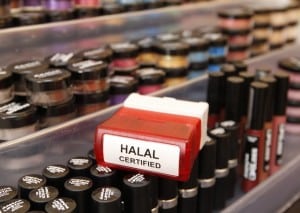By Aiman Jahangir, Halal Technical Expert and Assistant Manager Certification at Center for Halal Assurance
 Women have been using beauty and skincare products through the ages. Studies reveal that the earliest evidence of skincare products and cosmetics came from Ancient Egypt and Greek. The women of that era used to take care of their skin by applying different natural ingredients which are also being used till now including olive oil, milk, oats, dead sea salt, etc. Firstly they started these products to protect their skin from sunburn, blemishes, wrinkles, etc while with the passing days, trends started changing.
Women have been using beauty and skincare products through the ages. Studies reveal that the earliest evidence of skincare products and cosmetics came from Ancient Egypt and Greek. The women of that era used to take care of their skin by applying different natural ingredients which are also being used till now including olive oil, milk, oats, dead sea salt, etc. Firstly they started these products to protect their skin from sunburn, blemishes, wrinkles, etc while with the passing days, trends started changing.
Along with the skincare products, they started using different chemical products to decor their skin. Studies also reveal that they used to apply heavy eye shades, lead, mercury and chalk to color their faces; also they used to redden their lips with distilled alcohol or vinegar. Hence, women in every era are found to be fond of using beauty products.
Key Ingredients
The key ingredients present in most cosmetics include water, emulsifiers, preservatives, thickeners, moisturizers, colors, and fragrances etc. These ingredients can be naturally occurring or artificial depending on the type of product being manufactured. There are a large number of synthetic ingredients being used in the cosmetic industry.
The natural sources of ingredients being used in cosmetics are from animals, plants, aquatic source, insects and human. Alcohol is also being used in many products. Insects and alcohol based products are forbidden for the consumption purpose according to Shari’ah but in beauty products, they are permissible (beyond allowable content) for external appliances only and thus are permitted in color cosmetics which are not absorbed by the skin.
Non Permissible Ingredients
Alcohol from natural source like grapes and dates as it is Najis, is strictly prohibited by Shari’ah for consumption and even in beauty or cosmetic products, therefore Halal products shouldn’t contain this; also the natural alcohol is hardly being used in recent days but care must be taken. However, synthetically prepared alcohol can be used to some extent.
Halal cosmetics refer to the products which contain only permissible ingredients according to the Islamic Law without Haram/Najis and alcohol in it. Halal cosmetics should not contain any ingredient from Pig, or any other Haram animal, poisonous plants, blood, carcass, hair, alcohol or any Human based product (placenta, hair etc). All of these products are declared Haram & Najis and even during processing, manufacturing and packaging if the Halal product came in contact with these (Najis/Haraam), that product will lose its Halal status.
Permissible Ingredients
For the product claimed to be Halal, the ingredients used in it should be Tahir (pure). Ingredients that are from those animals which are Halal and are slaughtered according to the rulings of Islam are considered Halal. Also, the halaal products shouldn’t harm the consumer.
On the other hand, if the product contains any ingredient from the things that are prohibited by Islamic law is Haraam, this includes Haraam animals, Halal animals not slaughtered according to Shari’ah rulings, things that cause intoxications, things abominable to human being etc. For the external application, where the product is not absorbed by the skin, Islamic law has given flexibility to some ingredients.
In recent days, Vegan beauty products have also gained the limelight due to the absence of chemicals in them and their safe nature but care must be taken as they might contain alcohol in them.
Oil & Fat Ingredients
In cosmetics or personal care products, oil & fat is the key ingredient for the smooth texture of the final product as it makes them easily spreadable. Over time, research revealed that the Non Muslim manufacturers were using pork oil & lard in them, this news was alarming enough for the Muslim & Jewish women in the world as Pig is the filthiest animal and Haraam in Islam, Judaism and some other religions too. Lipsticks can be ingested easily therefore should be avoided.
Muslim ladies while using lipsticks must consider the source of the ingredients being used in the product. They should avoid these types of products to remain safe and hygienic and to live according to Sharia’ah.
Coloring in Cosmetic Products
Similarly, red color is commonly used in lipsticks, blushes, and other color cosmetic products. This is extracted from an insect named “cochineal/Carmine”. Thousands of insects are crushed just to obtain a small amount of red color (E120). Carmine (E120) is Haram for the intake purpose but allowed for cosmetic except for lipstick, due to chances of ingestion.
Carmine is also present in some food items like jelly, ice creams etc, which provide them a red shade. This ingredient also has some adverse health effects i-e, it is found to be allergic in some cases but FDA has allowed its use on the condition that the manufacturer must mention “insect based carmine” in the ingredient list on the packaging. But it’s better to avoid those products which contain this ingredient in them. However, red dye is also prepared synthetically and from different plants like red roses etc.
Collagen and Glycerine in Personal Care Products
Collagen is the key ingredient being used in personal care products as an anti-aging ingredient. This is a highly critical ingredient that can be obtained from animal and aquatic sources. Collagen from fish is permissible to use while animal derived has serious concerns in it.
Glycerine is the odorless liquid type substance being used in personal care products as Glycerine itself or the form of glycolic acid. It functions as a humectant. It is obtained from plant or animal sources and also prepared synthetically. If derived from a plant source, it’s pure but if from an animal source, care must be taken as if from Halal animal (slaughtered according to Shari’ah) is permissible while if from porcine or any other Haram animal, Muslims are not allowed to use as prohibited by the Shari’ah.
Stearic acid and other dubious ingredients
Stearic acid in the form of stearates is being used in different commodities like soaps, detergents textiles, supplements, etc. It is commonly used in a variety of cosmetics and personal care products as an emulsifier, thickening agent, hardening agent, and fragrance ingredient in deodorant, soaps, hair products, and moisturizers. It is also included in the list of the critical ingredients as it can be obtained from Porcine. Hydrolysis of pig’s stomach is done to obtain stearic acid. Cows and sheep are also being used to obtain this ingredient. For Halal animal-based ingredients, the permissible animal should be slaughtered following the Shari’ah Law. On the other hand, it can also be obtained from plants fats, and oils.
The other animal based ingredients include Lanolin alcohol, keratin (Hair protein), and gelatin. They can be porcine or any other haram animal based or extracted from bovine. If porcine or any other haram animal based, the products will be Haram but if beef or other halal animal based is used, it will not affect its Halal status. The contemporary issue in the Halal cosmetics industry also includes the use of dead animals along with porcine in the manufacturing of different products.
Human & animal placenta-based personal care products are also available in the market as they have anti-aging and anti-inflammatory properties and help in repairing & conditioning the skin and hair. Similarly, stem cells from animals, humans, and, plants have also been used in beauty products that help to rejuvenate and plump skin. Products having human-based ingredients must be avoided while plant-based can be used.
Supply Chain
For Halal beauty products, not only formulation should be Tahir but all the steps including storage and transportation (Supply chain) should be according to the Shari’ah rules and Hygiene and cleanliness must be assured. From preparation until transportation every step should be free from dirt, filth or Najis.
Overview
Having a piece of adequate knowledge about Halal cosmetics is highly recommended for the 2.5 Billion Muslim community. According to reports, the Global Halal Market is predicted to grow at an annual growth rate of 6.8% until 2024. Muslims in different countries are now showing high concern for Halal cosmetics. With the increase in demand for Halal cosmetics, different brands are now launching Halal certified cosmetics.
Muslims in different parts of the world are expressing interest in purchasing these products. But in Pakistan, due to the unavailability of enough knowledge, people don’t take the matter of cosmetics being Halal much seriously. With the increasing use of Haram/Najis ingredients, we have to pay attention to the use of Halal beauty products. In the coming years, Halal cosmetics just like Halal Food will be demanded by Muslims and non Muslims equally due to their safe and hygienic nature.



